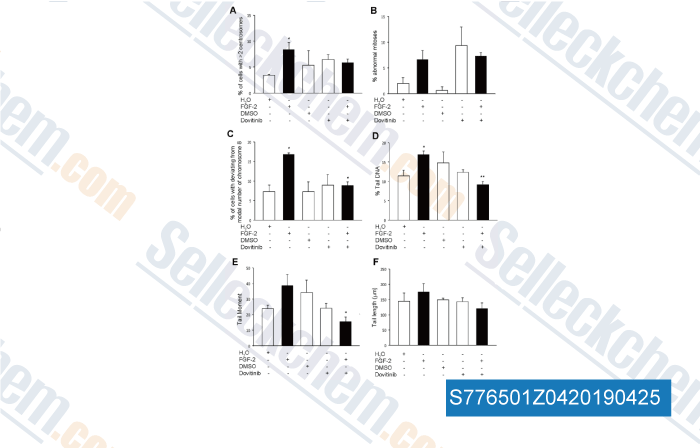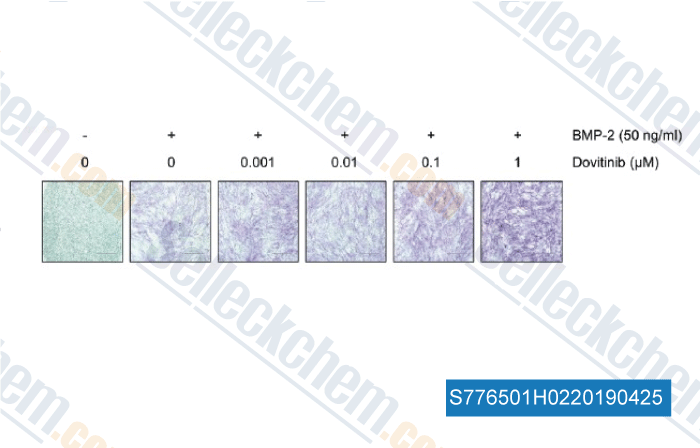|
Toll Free: (877) 796-6397 -- USA and Canada only -- |
Fax: +1-832-582-8590 Orders: +1-832-582-8158 |
Tech Support: +1-832-582-8158 Ext:3 Please provide your Order Number in the email. |
Technical Data
| Formula | C24H29FN6O5 |
|||
| Molecular Weight | 500.52 | CAS No. | 915769-50-5 | |
| Solubility (25°C)* | In vitro | DMSO | 100 mg/mL (199.79 mM) | |
| Water | 66 mg/mL (131.86 mM) | |||
| Ethanol | 1 mg/mL (1.99 mM) | |||
|
* <1 mg/ml means slightly soluble or insoluble. * Please note that Selleck tests the solubility of all compounds in-house, and the actual solubility may differ slightly from published values. This is normal and is due to slight batch-to-batch variations. * Room temperature shipping (Stability testing shows this product can be shipped without any cooling measures.) |
||||
Preparing Stock Solutions
Biological Activity
| Description | Dovitinib (TKI258) Lactate monohydrate is the Lactate of Dovitinib, which is a multitargeted RTK inhibitor, mostly for class III (FLT3/c-Kit) with IC50 of 1 nM/2 nM, also potent to class IV (FGFR1/3) and class V (VEGFR1-4) RTKs with IC50 of 8-13 nM, less potent to InsR, EGFR, c-Met, EphA2, Tie2, IGFR1 and HER2. Phase 4. | |||||||||||
|---|---|---|---|---|---|---|---|---|---|---|---|---|
| Targets |
|
|||||||||||
| In vitro | Dovitinib potently inhibits the FGF-stimulated growth of WT and F384L-FGFR3-expressing B9 cells with IC50 of 25 nM. In addition, Dovitinib inhibits proliferation of B9 cells expressing each of the various activated mutants of FGFR3. Interestingly, there are minimal observed differences in the sensitivity of the different FGFR3 mutations to Dovitinib, with the IC50 ranging from 70 to 90 nM for each of the various mutations. IL-6-dependent B9 cells containing vector only (B9-MINV cells are resistant to the inhibitory activity of Dovitinib at concentrations up to 1 μM. Dovitinib inhibits cell proliferation of KMS11 (FGFR3-Y373C), OPM2 (FGFR3-K650E), and KMS18 (FGFR3-G384D) cells with IC50 of 90 nM (KMS11 and OPM2) and 550 nM, respectively. Dovitinib inhibits FGF-mediated ERK1/2 phosphorylation and induces cytotoxicity in FGFR3-expressing primary MM cells. BMSCs does confer a modest degree of resistance with 44.6% growth inhibition for cells treated with 500 nM Dovitinib and cultured on stroma compared with 71.6% growth inhibition for cells grown without BMSCs. Dovitinib inhibits proliferation of M-NFS-60, an M-CSF growth-driven mouse myeloblastic cell line with a median effective concentration (EC50) of 220 nM. [1] Treatment of SK-HEP1 cells with Dovitinib results in a dose-dependent reduction in cell number and G2/M phase arrest with reduction in the G0/G1 and S phases, inhibition of anchorage-independent growth and blockage of bFGF-induced cell motility. The IC50 for Dovitinib in SK-HEP1 cells is approximately 1.7 μM. Dovitinib also significantly reduces the basal phosphorylation levels of FGFR-1, FGFR substrate 2α (FRS2-α) and ERK1/2 but not Akt in both SK-HEP1 and 21-0208 cells. In 21-0208 HCC cells, Dovitinib significantly inhibits bFGF-induced phosphorylation of FGFR-1, FRS2-α, ERK1/2 but not Akt. [2] |
|||||||||||
| In vivo | Dovitinib induces both cytostatic and cytotoxic responses in vivo resulting in regression of FGFR3-expressing tumors.[1] Dovitinib shows a dose- and exposure-dependent inhibition of target receptor tyrosine kinases (RTKs) expressed in tumor xenografts. Dovitinib potently inhibits tumor growth of six HCC lines. Inhibition of angiogenesis correlated with inactivation of FGFR/PDGFRβ/VEGFR2 signaling pathways. In an orthotopic model, Dovitinib potently inhibits primary tumor growth and lung metastasis and significantly prolonged mouse survival. [2] Administration of Dovitinib results in significant tumor growth inhibition and tumor regressions, including large, established tumors (500-1,000 mm3). [3] |
Protocol (from reference)
| Kinase Assay: |
|
|---|---|
| Cell Assay: |
|
| Animal Study: |
|
References
Customer Product Validation

-
, , Genome Biol, 2014, 15(8):428.

-
Data from [Data independently produced by , , Neoplasia, 2013, 15(8):975-88]

-
Data from [Data independently produced by , , Urol Oncol, 2018, 36(8):365]

-
Data from [Data independently produced by , , Mol Cells, 2016, 39(5):389-94]
Selleck's Dovitinib (TKI258) Lactate monohydrate has been cited by 31 publications
| Lysine acetylation restricts mutant IDH2 activity to optimize transformation in AML cells [ Mol Cell, 2021, S1097-2765(21)00507-4] | PubMed: 34289383 |
| Targeting fibroblast growth factor receptors to combat aggressive ependymoma [ Acta Neuropathol, 2021, 10.1007/s00401-021-02327-x] | PubMed: 34046693 |
| Newly identified members of fibroblast growth factor receptor 1 splice variants engage in crosstalk with the AXL/AKT axis in salivary adenoid cystic carcinoma [ Cancer Res, 2021, canres.1780.2020] | PubMed: 33408119 |
| Effects of FGFR Tyrosine Kinase Inhibition in OLN-93 Oligodendrocytes [ Cells, 2021, 10(6)1318] | PubMed: 34070622 |
| Entrectinib Induces Apoptosis and Inhibits the Epithelial-Mesenchymal Transition in Gastric Cancer with NTRK Overexpression [ Int J Mol Sci, 2021, 23(1)395] | PubMed: 35008821 |
| TRK inhibitors block NFKB and induce NRF2 in TRK fusion-positive colon cancer [ J Cancer, 2021, 12(21):6356-6362] | PubMed: 34659525 |
| TRK inhibitors block NFKB and induce NRF2 in TRK fusion-positive colon cancer [ Journal of Cancer, 2021, 12(21): 6356-6362] | PubMed: None |
| Comprehensive pharmacogenomic characterization of gastric cancer. [ Genome Med, 2020, 18;12(1):17] | PubMed: 32070411 |
| Effects of FGFR inhibitors TKI258, BGJ398 and AZD4547 on breast cancer cells in 2D, 3D and tissue explant cultures [ Cell Oncol (Dordr), 2020, 10.1007/s13402-020-00562-0] | PubMed: 33119860 |
| Anti-Proliferative Effect of Allium senescens L. Extract in Human T-Cell Acute Lymphocytic Leukemia Cells [ Molecules, 2020, 26(1)E35] | PubMed: 33374788 |
RETURN POLICY
Selleck Chemical’s Unconditional Return Policy ensures a smooth online shopping experience for our customers. If you are in any way unsatisfied with your purchase, you may return any item(s) within 7 days of receiving it. In the event of product quality issues, either protocol related or product related problems, you may return any item(s) within 365 days from the original purchase date. Please follow the instructions below when returning products.
SHIPPING AND STORAGE
Selleck products are transported at room temperature. If you receive the product at room temperature, please rest assured, the Selleck Quality Inspection Department has conducted experiments to verify that the normal temperature placement of one month will not affect the biological activity of powder products. After collecting, please store the product according to the requirements described in the datasheet. Most Selleck products are stable under the recommended conditions.
NOT FOR HUMAN, VETERINARY DIAGNOSTIC OR THERAPEUTIC USE.
